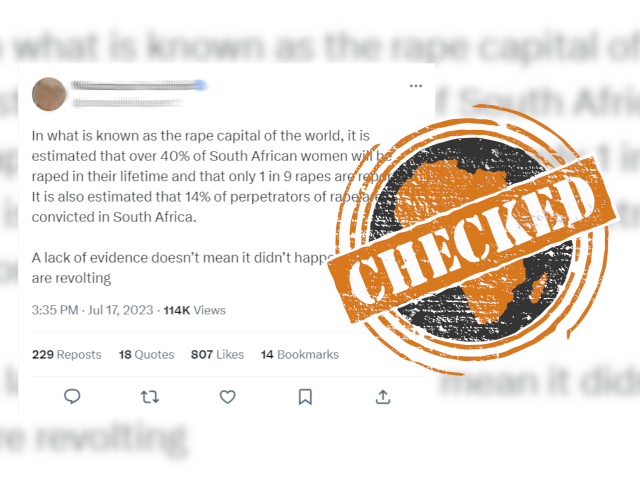This article is more than 10 years old
South Africa plans to establish 58 “dedicated” sexual offences courts which “should be fully operational” by September this year, according to the Vuk’uzenzele, the official South African Government Communication and Information System (GCIS) newspaper.
“These dedicated courts are necessary. When there are these dedicated courts, the conviction rate goes up,” the newspaper quoted Justice Minister Jeff Radebe saying.
Is this true? And how true is the claim that 58 courts will be operational by September?
Specialised courts do raise conviction rates
According to a department of justice advertorial, published in The Star newspaper in December 2008, 52 courts were eventually created and the “results were soon clear”.
“Conviction rates jumped from 42% to 62% overall...while the time taken from arrest to conviction was slashed to less than six months.”
Despite this, the justice minister at the time, Brigitte Mabandla, placed a moratorium on the further roll-out of sexual offences courts and suggested they be reintegrated into regional courts. It was hoped this would “lead to better case load management”. It didn't.
Closures caused fall in successful prosecutions
In July 2011, the then special director of public prosecutions for sexual offences, Thoko Majokweni, admitted that the demise of the specialised sexual offences courts had led to a decrease in successful prosecutions.
The “vulnerability” of the courts, she said, was that they had not been established by legislation, like other specialised courts, and could be “closed at will”.
A recent study by the Shukumisa Campaign - a coalition of 28 non-governmental organisations to address sexual violence - has found that there are currently only 15 sexual offences courts in South Africa. And only five of them qualify as “specialised courts” that provide “dedicated sexual offences courts, specialised prosecutors and magistrates who hear only sexual offences matters”.
Flaws in the new courts plan
There is no proper framework for the implementation of the courts and neither the department of justice’s performance plan for the current financial year nor its longer term strategic plan describe how the courts should be implemented, she noted.
It is also impossible to determine how much money has been budgeted for the programme. According to Vetten, budget allocations for improving the prosecution of sexual offences are “completely invisible” in both the department of justice and National Prosecuting Authority (NPA) budgets.
Dr Lillian Artz, a criminologist and associate professor at the University of Cape Town’s Gender Health and Justice Research Unit, echoed Vetten’s comments: “There is a lot of confusion about the courts. There is no framework for what the courts will look like, and you can’t draw up a budget if you don’t know what you’re paying for.”
Dedicated or specialised?
One area of confusion is whether the courts will be “dedicated” or specialised”. Politicians and senior government officials tend to use the terms interchangeably. In submissions to parliament, Shukumisa argued that “what the courts are called is not a simply a matter of semantics”.
According to a 2012 justice department draft policy on the specialisation of services for victims of sexual offences, “specialist courts proper” are courts which have been created by legislation and which are designed to hear a narrow range of cases.
Dedicated courts, on the other hand, are ordinary courts and personnel that have been set aide to hear particular cases.
Makeke says that describing the courts as “dedicated” is the more appropriate term.
Artz says the distinction is meaningless as there is no framework setting out how “dedicated” or “specialist” courts will function. “So they’ve said there are two forms but they still haven’t actually defined what they are or what they look like.”
Will the courts happen?
“The reality is our capacity is decreasing. Vacancies that arise are not filled,” Willie Hofmeyr, an NPA deputy national director, reportedly told MPs. “When we lose experienced people, we cannot replace them.” An increasing salary bill and bonuses were largely to blame for the shortfall, Hofmeyr said.
The result is that a lack of resources threatens to undermine the process.
Majokweni, now acting national deputy director of public prosecutions, told parliament’s Justice Portfolio committee: “We are afraid that [the lack of staff and resources will] undermine the very process of creating the sexual offences courts."
NPA spokesperson, Bulelwa Makeke, told Africa Check this week that the current resources available to the NPA “would not be sufficient to resource all dedicated courts as envisaged”.
“[W]ith the current budget challenges, the NPA will not be in a position to provide the relevant prosecutors.”
Conclusion
Certainly it appears that "specialised" courts do raise conviction rates. Though there are important differences between "dedicated" and "specialised" courts in the legal backing they receive, the minister's claims about the impact such courts can have are indeed correct.
However the claim in the Vuk’uzenzele report that 58 such courts will be operational by September - just a few months from now - appears to be untrue.
The NPA has told parliament that it does not have the budget to staff the courts and there also appears to be no clear framework for how the courts will operate.
Edited by Julian Rademeyer




Add new comment